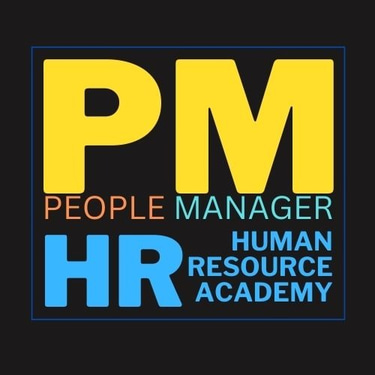COURSES | LIVE SESSIONs | LOGIN
Industrial Relations, Union Management & Labour laws Specialist Certificate Program
The Certification in Industrial Relations, Union Management & Labour Laws (IRUMLL) is a specialized course that equips HR Practitioner with the skills and knowledge required to manage Employee and Industrial relations in organizations. This Certification program focuses on effective workforce management, conflict resolution, and ensuring harmonious labour-management relations.
INDUSTRIAL RELATIONS CERTIFICATION
People Manager


About the Certification Program

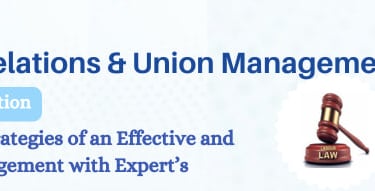
---------------------------------------------------------------------------------------------------------------
Master the concepts of Employee & Workplace Relations to become a Certified Industrial Relations Specialist with People Manager's Online Certification Course on the Advanced Industrial Relation, Union Management Strategies & Initiative .
Gain a detailed understanding of Industrial Relations, Union Management Initiatives, Workplace Engagement Program Measurement & Business Impact to facilitate efficient Industrial Development and Achieve Strategic Business Goals.
Salient Features of the Program
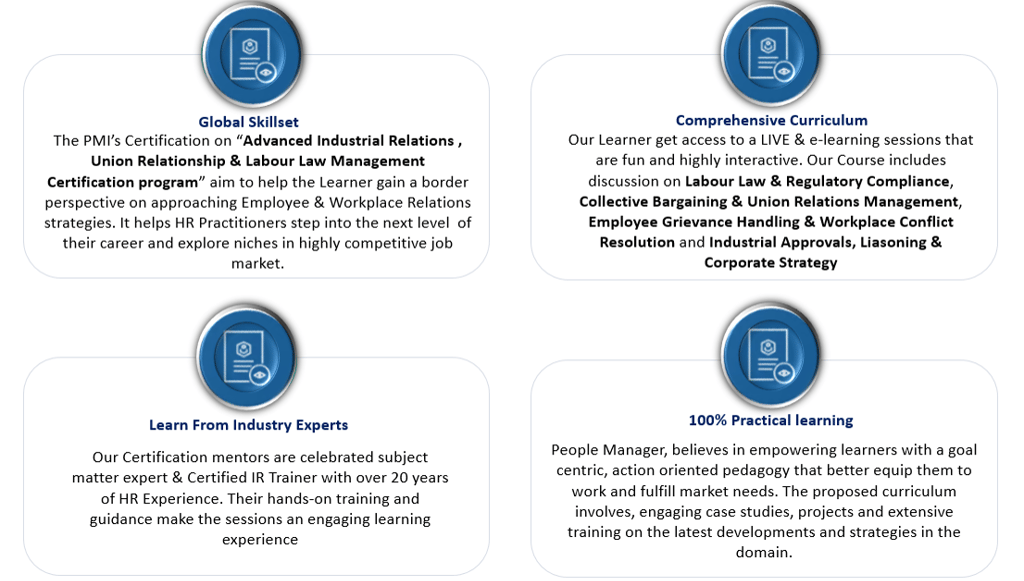

Benefits
4 COMPETENCIES, 40+ SKILLS DEVELOPMENT
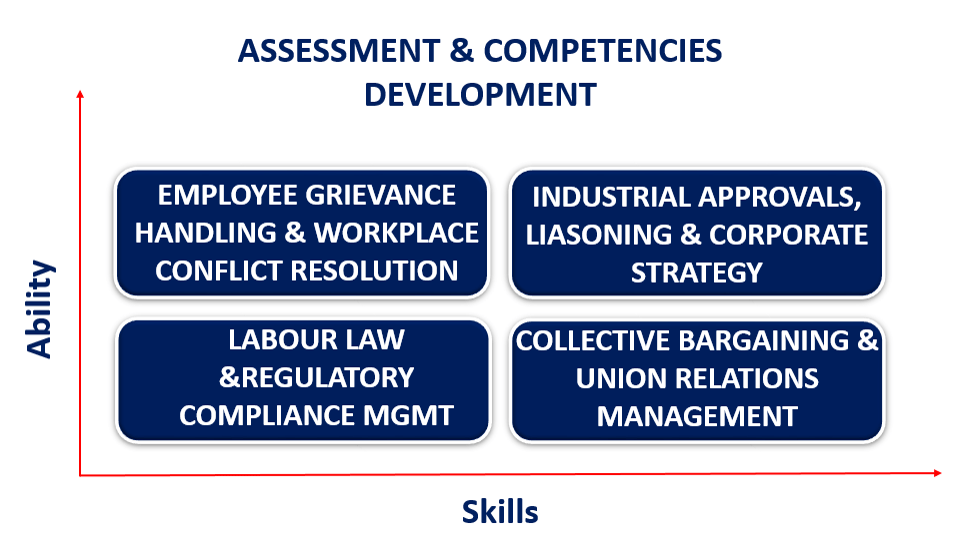

LABOUR LAW & REGULATORY COMPLIANCE
Conducting labor law audits to ensure compliance.
Drafting employment contracts, ensuring adherence to legal frameworks.
Filing statutory compliance reports with government authorities.
Managing legal documentation related to layoffs, severance, and employee rights.
Reviewing HR policies to align with labor law changes.
Handling court cases & arbitration for labor disputes.
Organizing employee awareness programs on workplace rights.
Assisting in corporate legal advisory on employment law risks.
Conducting internal investigations for labour law violations.
Liaising with government agencies for labour inspections & approvals.
COLLECTIVE BARGAINING & UNION RELATIONS MANAGEMENT
Leading union negotiations during wage settlements.
Drafting and reviewing Collective Bargaining Agreements (CBA).
Mediating conflicts between employers and unions.
Conducting union grievance redressal meetings.
Analyzing industry-wide wage standards to support negotiations.
Establishing union representation policies within organizations.
Preparing strategic union engagement frameworks for companies.
Organizing leadership training programs on union relations.
Handling union elections and membership concerns.
Advising on legal implications of union actions like strikes or protests.
EMPLOYEE GRIEVANCE HANDLING & WORKPLACE CONFLICT RESOLUTION
Designing grievance redressal mechanisms within companies.
Conducting domestic inquiries for workplace misconduct cases.
Mediating employee-employer disputes professionally.
Implementing disciplinary actions in accordance with employment laws.
Handling harassment and discrimination investigations.
Training HR teams on effective conflict resolution techniques.
Drafting termination policies while ensuring compliance.
Analyzing employee feedback trends for workplace improvement.
Facilitating employee assistance programs for mental well-being.
Coordinating workplace ethics initiatives for harmonious labor relations.
INDUSTRIAL APPROVALS, LIASONING & CORPORATE STRATEGY
Managing government approvals for Greenfield industrial projects.
Handling legal formalities for mergers and acquisitions.
Facilitating factory closure negotiations with employees and unions.
Conducting workplace audits for labor compliance.
Filing license renewals with regulatory bodies.
Negotiating with government officials for industrial policy considerations.
Managing statutory approvals for large-scale industrial operations.
Leading corporate restructuring discussions from an IR perspective.
Preparing compliance reports for industrial safety and labor welfare regulations.
Developing strategic workforce planning policies aligned with legal mandates.
Advanced Industrial Relations , Union Relationship & Labour Law Management Framework
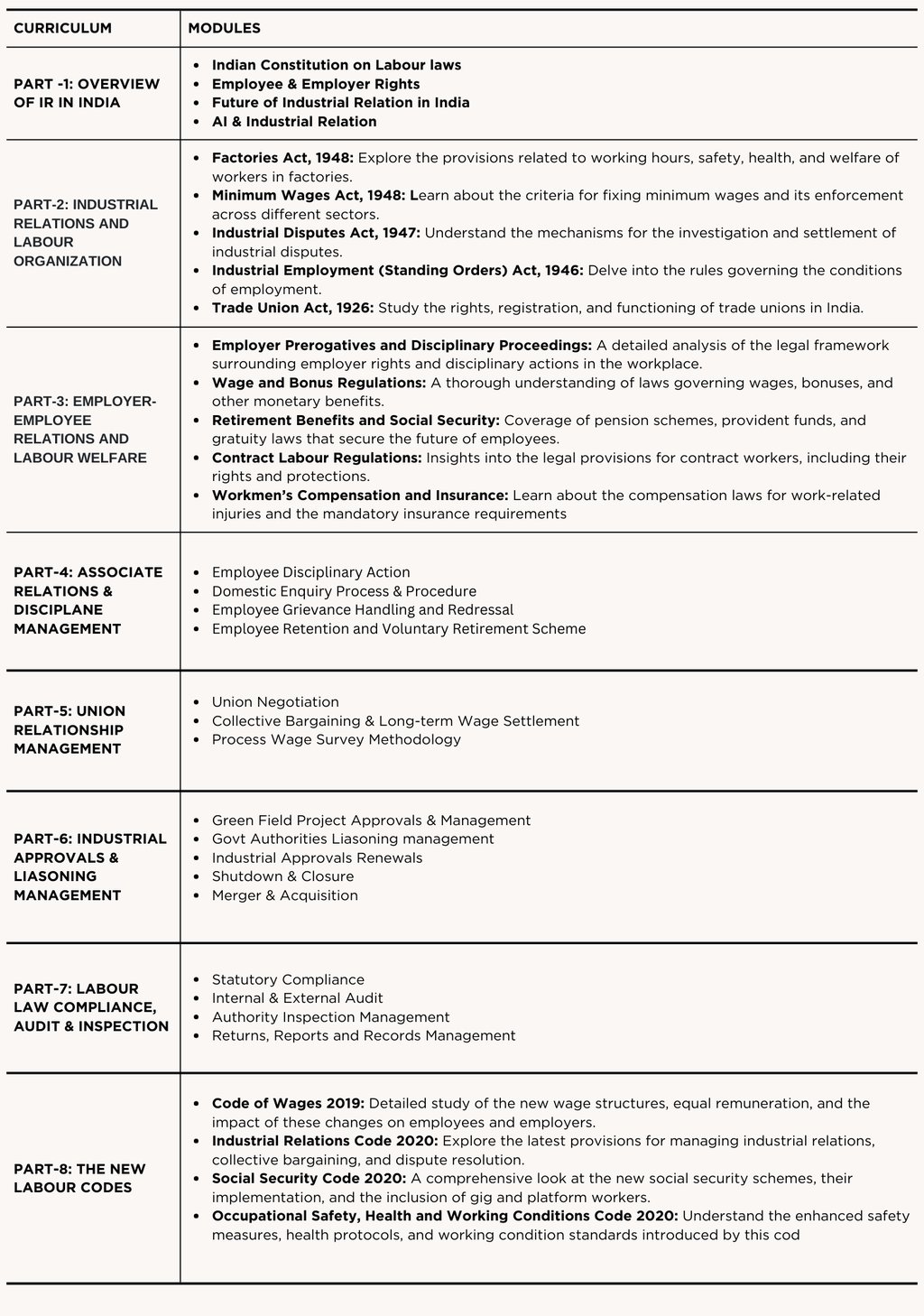

Objectives of the Industrial Relations, Union Management & Labour Laws Certification Program
The objectives of the PMI's Certification in Industrial Relations, Union Management & Labour Laws (IRUMLL) program are to enable participants to:
Build strong domain expertise in Industrial Relations, Labour Laws, and Union Management
Develop effective strategies for workforce management and employee relations
Master conflict resolution techniques to ensure harmonious labour-management relations
Gain practical knowledge of labour laws and compliance for workplace governance
Implement best practices for negotiation and collective bargaining with unions
Enhance organizational effectiveness through structured industrial dispute resolution mechanisms
Establish effective frameworks for employee grievance handling and disciplinary procedures
Learn to manage labour policies in alignment with legal and regulatory standards
Become a trusted advisor in HR and Industrial Relations for business success
---------------------------------------------------------------------------------------------------------------------------------------------------------
Key Takeaways
60 Hours Of Action-Oriented Online Learning
Guaranteed Opportunities For Career Growth
Practice Materials and DIY Toolkits
Recorded Videos of All Sessions
Completion Certificate
Pre Course Online skill Assessment
Post Course Completion Online Assessment for Certification
Certified Industrial Relations, Union Management & Labour Law Specialist Certificate
Who Can Join?
Anyone who is known to Labour law & IR Functions or wants to levels up on the Advanced Industrial Relations, Union Management, Employee Relations, LLCM & Approval Management System developments and trends
HR professionals who want to learn more about Labour Law & industrial Relation, Union Management & Industrial Approval Management contexts of their Business. Managers who already use a Compliance management system, but need to improve it
CEOs, Business Owners, HODs, and managers interested in an effective Compliance management tool to thrive in their business
Professionals involved with Business Agility to learn a new way of the agile framework. Labour law & Liasoning Consultants and Trainers
Providers (e.g., consultants, administrators, Coaches) looking to broaden their knowledge to better serve their clients
HR Professionals, Legal Advisors, Union Representatives, and IR Practitioners
Target Learners

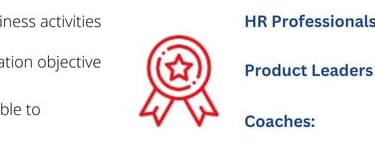
----------------------------------------------------------------------------------------------------------------------
Program Schedule
[Syllabus]
This course is structured into Five modules. The basic structure of the courses is as follows:
MODULE 1: FOUNDATIONS OF INDUSTRIAL RELATIONS IN INDIA
Chapter 1: Overview of Industrial Relations
Evolution of industrial relations in India
Role of employers, employees, and government
Key challenges in labor-management relations
Chapter 2: Constitutional Provisions on Labour Laws
Labor rights under the Indian Constitution
Fundamental rights and Directive Principles related to labor
Government initiatives for labor protection
Chapter 3: Employee & Employer Rights
Employment contracts and legal obligations
Rights of workers in organized vs. unorganized sectors
Case study: Landmark Supreme Court rulings on labor rights
Chapter 4: Future of Industrial Relations in India
Impact of globalization on labor policies
Economic reforms and their effect on employment structures
Future trends in labor-management relations
Chapter 5: AI & Industrial Relations
Role of AI in workforce management
Digital automation and labor law compliance
Interactive workshop: AI-driven HR compliance monitoring
MODULE 2: INDUSTRIAL RELATIONS & LABOUR ORGANIZATION
Chapter 6: Factories Act, 1948
Regulations on working hours, safety, and welfare
Implementation of occupational health standards
Case study: Factory safety violations and legal consequences
Chapter 7: Minimum Wages Act, 1948
Principles of wage fixation
Minimum wage enforcement across different sectors
Workshop: Calculating industry-wise wage benchmarks
Chapter 8: Industrial Disputes Act, 1947
Mechanisms for investigating and resolving disputes
Legal framework for strikes, lockouts, and layoffs
Mock negotiation session: Resolving an industrial dispute
Chapter 9: Industrial Employment (Standing Orders) Act, 1946
Standardizing employment rules
Drafting workplace policies for compliance
Practical assignment: Creating standing orders for an organization
Chapter 10: Trade Union Act, 1926
Union registration, legal rights, and governance
Collective bargaining mechanisms
Role-play session: Forming and managing trade unions
MODULE 3: EMPLOYER-EMPLOYEE RELATIONS & LABOUR WELFARE
Chapter 11: Employer Prerogatives & Disciplinary Proceedings
Management rights in employment
Legal framework for disciplinary actions
Workshop: Conducting disciplinary hearings
Chapter 12: Wage & Bonus Regulations
Legal compliance with payment of wages
Bonus eligibility and calculation methods
Practical task: Drafting wage structures
Chapter 13: Retirement Benefits & Social Security
Provident funds, gratuity, and pension schemes
Implementation of EPFO and ESIC benefits
Case study: Social security disputes and resolutions
Chapter 14: Contract Labour Regulations
Rights and protections for contract workers
Legal obligations of employers hiring contract labour
Simulation exercise: Conducting contract labour audits
Chapter 15: Workmen’s Compensation & Insurance
Compensation for work-related injuries
Workplace insurance requirements
Compliance checklist for compensation claims
MODULE 4: UNION RELATIONSHIP MANAGEMENT & DISCIPLINE MANAGEMENT
Chapter 16: Employee Disciplinary Action
Handling misconduct cases
Preventive measures for employee discipline
Workshop: Designing disciplinary frameworks
Chapter 17: Domestic Enquiry Process & Procedure
Investigating workplace misconduct
Legal documentation for employee inquiries
Live simulation: Conducting a domestic inquiry
Chapter 18: Employee Grievance Handling
Redressal mechanisms for employee complaints
Employer responsibilities in grievance resolution
Practical case study: Handling a workplace grievance
Chapter 19: Employee Retention & Voluntary Retirement
Strategies for reducing employee turnover
Legal aspects of voluntary retirement schemes
Interactive discussion: Best employee retention practices
Chapter 20: Union Negotiation & Collective Bargaining
Negotiation tactics for labor agreements
Drafting collective bargaining agreements
Role-play session: Employer-union wage negotiations
Chapter 21: Wage Settlement & Survey Methodology
Wage structuring in collective agreements
Conducting industry-wide wage surveys
Hands-on project: Developing a wage survey framework
MODULE 5: LABOUR LAW COMPLIANCE, INSPECTIONS & THE NEW LABOUR CODES
Chapter 22: Statutory Compliance Management
Ensuring legal compliance in HR policies
Industry standards for labor law adherence
Workshop: Preparing statutory compliance reports
Chapter 23: Labour Audit & Inspection Management
Conducting internal audits for labor practices
Government inspection procedures and employer obligations
Mock audit session: Handling external compliance inspections
Chapter 24: Returns, Reports & Records Management
Filing legal labor reports with authorities
Documentation best practices for compliance
Practical task: Preparing compliance records
Chapter 25: The New Labour Codes – Code of Wages 2019
Wage structures, minimum wage policies
Impact of the new wage code on employers and employees
Group discussion: Challenges in wage code implementation
Chapter 26: Industrial Relations Code 2020
Collective bargaining updates
Modern approaches to dispute resolution
Workshop: Creating IR policies under new legal frameworks
Chapter 27: Social Security Code 2020
Coverage and implementation of new social security schemes
Inclusion of gig and platform workers
Case study: Analyzing social security benefits under the new code
Chapter 28: Occupational Safety, Health & Working Conditions Code 2020
Strengthened safety protocols
Health and welfare measures for employees
Live workplace safety drill simulation
📝 Assessment & Certification
Evaluation Methods
Practical Assignments (Case studies, mock negotiations)
Live Simulations (Role-play grievance handling, disciplinary actions)
Legal Compliance Tests (Evaluating industrial approvals, statutory filings)
Industry Project (Participants analyze real-world industrial relations challenges)
Final Certification
Participants receive a Certified Industrial Relations , Union Management & Labour Law Specialist certificate upon successful completion.
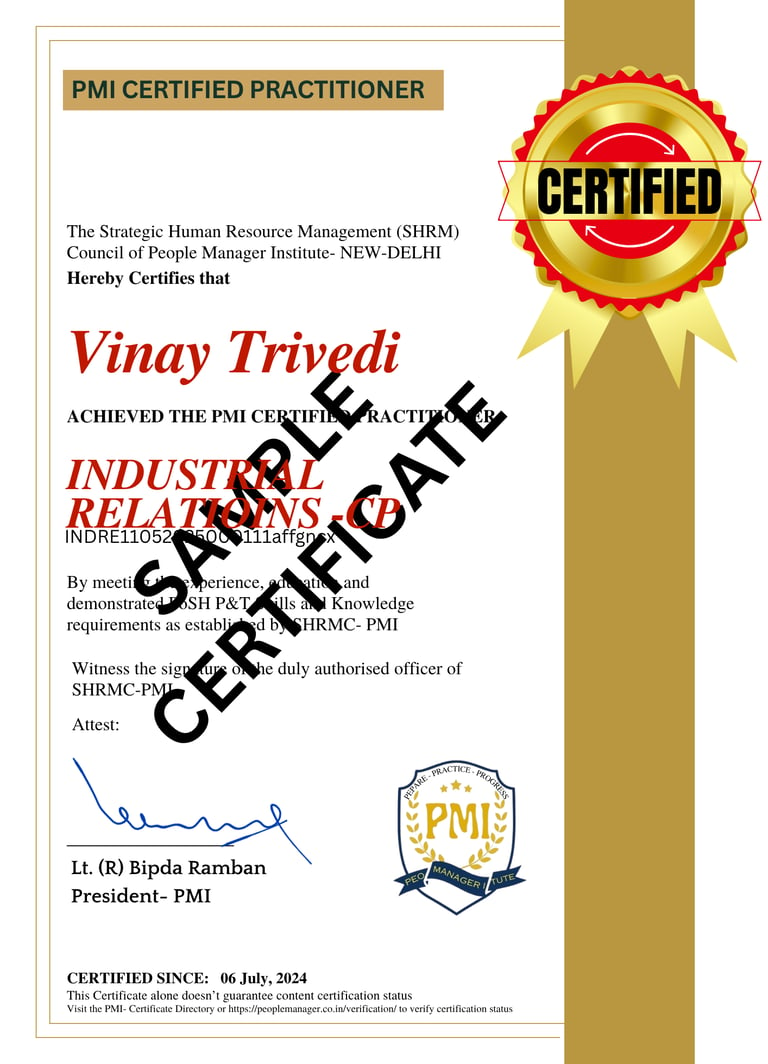

Sample Certificate
Don't Miss!!
Enroll Now with ever Least fee to become Certified Industrial Relations Specialist
Pre-Assessment
Assess Your Current skills in Industrial Relations Management to align your self with the specialist abilities
Practices with Experts to build your capabilities in Labour law & regulatory compliance, Collective bargaining & union relations management, Employee grievance handling & Workplace conflict resolution & Industrial approvals, liasoning & corporate strategy
Evaluate Your Nurtured Ability Post Program Completion and become Certified Industrial Relations Specialist
